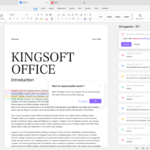Tips for Comparing Internet Plans
Choosing the best internet plan might seem like a daunting task, given the numerous providers and offers in the market. However, knowing which factors to prioritize when selecting the most suitable plan is essential. In this article, we provide valuable tips on how to compare different internet plans and make an informed decision.
Top 4 Tips for Comparing Internet Plans
Analyzing Your Internet Requirements
Home Internet has become an essential service in many places around the world. One of the most important factors when looking for a home internet plan is internet speed. Internet speed is the rate at which data is transmitted over the Internet. It determines how fast your internet connection is and how quickly you can access and send information. However, determining your internet speed requirements can be tricky, as it depends on your usage habits and the number of devices connected to your network.
Internet speeds impact how fast you can stream videos, browse, and download files. Speeds are usually measured in Megabits per second (Mbps), and higher speeds translate to a better experience. Keep in mind that while some providers advertise “up to” certain speeds, actual speeds may vary.
To determine your internet speed requirements, first, assess your internet usage. Do you use the internet for simple browsing and checking emails, or do you stream videos and play online games? If you use the internet for simple tasks, such as checking emails and browsing the web, a lower speed plan may suffice. However, if you regularly stream videos, participate in online gaming, or work from home, you’ll need a higher-speed plan to support these activities.
Another factor to consider is the number of devices connected to your network. If you have multiple devices constantly connected to the internet, such as smartphones, laptops, and smart TVs, you’ll need a plan with higher bandwidth to prevent lag and slow speeds. As a rule of thumb, it’s best to choose an internet plan that provides enough bandwidth to support all your devices at once.
Once you have a clear picture of your internet needs, you can then choose a plan that meets your requirements. For instance, if you are a small household with a few devices and light usage, a basic plan with a lower data allowance and speed will suffice. On the other hand, larger households with multiple users and devices that require high-speed connections for streaming and gaming should opt for more robust plans.
Comparing Speed and Data Limits
After assessing your internet needs, compare the speed and data limits offered by various providers. As discussed, the speed of your connection determines how fast your browsing experience will be. Data limits dictate the amount of data you can consume per month. If you exceed this limit, your internet speed may be throttled, or extra fees could be applied. Based on your usage, decide whether an unlimited data plan or a limited data plan is right for you. Remember, the higher the data limit, the more expensive the plan is likely to be.
Evaluating Contract Terms and Fees
The contract terms and fees associated with internet plans are crucial elements that can significantly impact your overall experience. Pay attention to the contract length, as it might affect your flexibility. Short-term or month-to-month contracts often provide you with the freedom to switch providers easily, while longer terms can offer better pricing and reduced setup costs.
Also, take note of any additional fees, such as installation and equipment costs, early termination fees, or late payment charges. Being aware of these costs can help you select a plan that fits your budget and avoids unpleasant surprises in the long run.
Researching Customer Support and Reliability
Lastly, research the level of customer support and reliability provided by the various internet service providers. Check their response times, customer reviews, and support channels, such as telephone, email, and online chats. You will want to choose a provider that offers timely assistance in case of any issues or queries.
Additionally, investigate the provider’s network reliability and overall performance in your area. A company with a strong reputation for consistent uptime and stable connections will ensure maximum satisfaction with your chosen plan.
Altogether, comparing internet plans requires a comprehensive analysis of your internet usage, speed and data limits, contract terms, fees, and provider reliability. By paying attention to these factors, you can make an informed decision when choosing the most suitable plan for your needs.


















